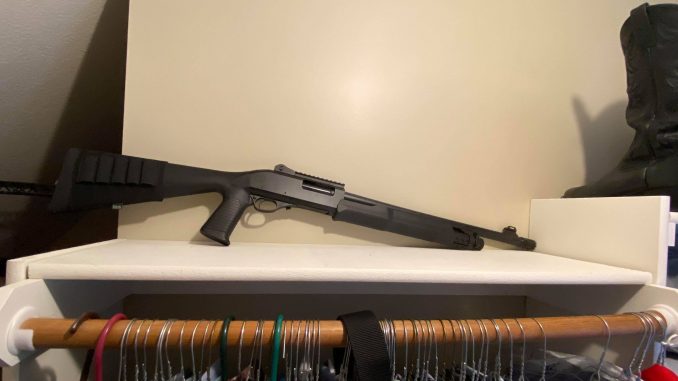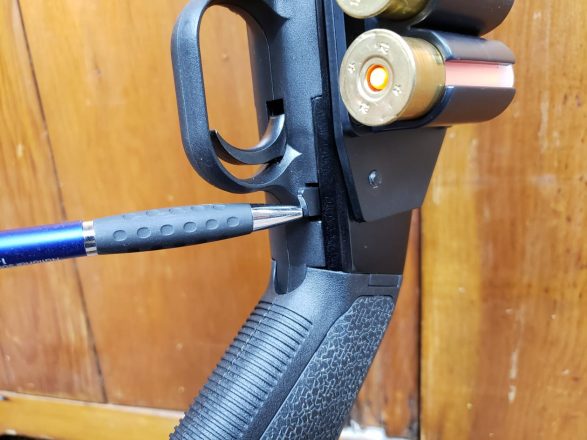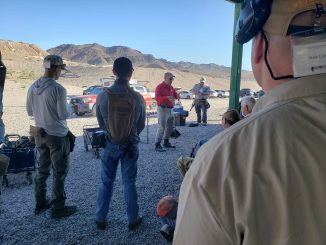
Now that we have our defensive shotgun, we must decide how we are going to store it. Will it sit completely empty in the safe until the next range trip? Or do we want our shotgun ready in the event of a home invasion? The former is an easy solution; ensure the shotgun is unloaded, then set it in its storage location. The latter gives us a few more options.
Cruiser Ready
“Cruiser ready” is how I typically recommend a defensive long gun, rifle or shotgun, be stored. This term is commonly used to refer to action unlocked, safety disengaged, with an empty chamber. To keep the action unlocked, the hammer must be down, which requires the trigger to be pressed. If doing this, physically and visually inspect your gun to ensure that the chamber is empty to prevent a negligent discharge of the shotgun. The last thing you want to do is accidently fire your gun inside your home or vehicle. This can result in property damage at best, and death at worst. If you are uncomfortable with pressing the trigger of your gun like this, simply press your action release lever. This is something you’ll want to practice on the range and in dry fire to build up the muscle memory.

To get the gun ready to fire, simply chamber a round in whatever way that is done with your chosen firearm. With a pump action, aggressively pull the forend completely to the rear, then completely forward. With a semiautomatic shotgun, you’ll need to aggressively pull the charging handle to the rear. The intricacies of a semiauto will vary based upon your make and model.
Cruiser Safe
Cruiser Safe is very similar to Cruiser Ready, with a few distinct changes. With Cruiser Safe, the action is locked, safety is on, and chamber is empty. To get the gun ready, disengage the action lock, cycle the action, then disengage the safety to fire.
These additional steps could be a benefit or detriment depending on your situation. On one hand, the additional safety could be helpful for those with children in the home or similar situations. However, it could result in more hang-ups in getting your gun ready in a defensive scenario. These drawbacks can be trained through, which will be dependent on the shooter. This is how I store my defensive long guns, whether they be a shotgun, PCC, or rifle.
Are Shotguns Drop Safe?
Generally speaking, no. Due to their weight, most long guns, and especially shotguns, are not drop safe. This issue is magnified once your start adding lights, spare ammunition, optics, and more. With the right impact the hammer can dislodge from the sear, potentially causing the gun to fire. That reason alone is one of the biggest reasons to store your shotgun with an empty chamber. This video from Justified Defensive Concepts clearly illustrates how little margin of error there is regarding shotguns and drop safety.
Why Store with an Empty Chamber
The majority of the times, we are storing our long guns for near immediate use. Whether it’s riding in the rack of a squad car, or sitting in the corner of a bedroom closet. An empty chamber protects us from an accidental discharge whether that’s from hitting a pot hole in your squad car, or it falling over in the closet. In an emergency, the shotgun can be brought into action by simply chambering the gun. If we’re expecting trouble, it can be quickly loaded, and the easily unloaded afterwards.
More Thoughts on Safe Storage
Want to learn the differences between gun safes, gun cabinets, cable locks, and more? Luckily we have a solution for you! Check out my article on options for safe firearms storage >>HERE<<. This primer will cover the most common options, many of which I use personally. These options can protect your firearms from both curious family members, and potential thieves.
More Shotgun Primers
Check out the other articles in our defensive shotgun primer series below!
Action Types for Defensive Shotguns
Sighting Systems for Defensive Shotguns
Ammunition Selection for Defensive Shotguns
Accessories for Defensive Shotguns
Defensive Shotgun Training and Resources
Support My Work
If you made it this far, thanks for reading! Writing isn’t my full-time profession, and nearly everything I do comes out of my own pocket. Between ammunition, tuition, range fees and more, expenses add up fast. If you like what I have to offer, consider making a donation to my Patreon.
Every bit helps bring more work like this to you, and contributes to shortened timelines or more in-depth work on my part. You’ll also have more direct access to me, offering suggestions for future projects, looking behind the scenes, and getting early access to some content. You can find my Patreon >>HERE<<





Very Informative, solid advice